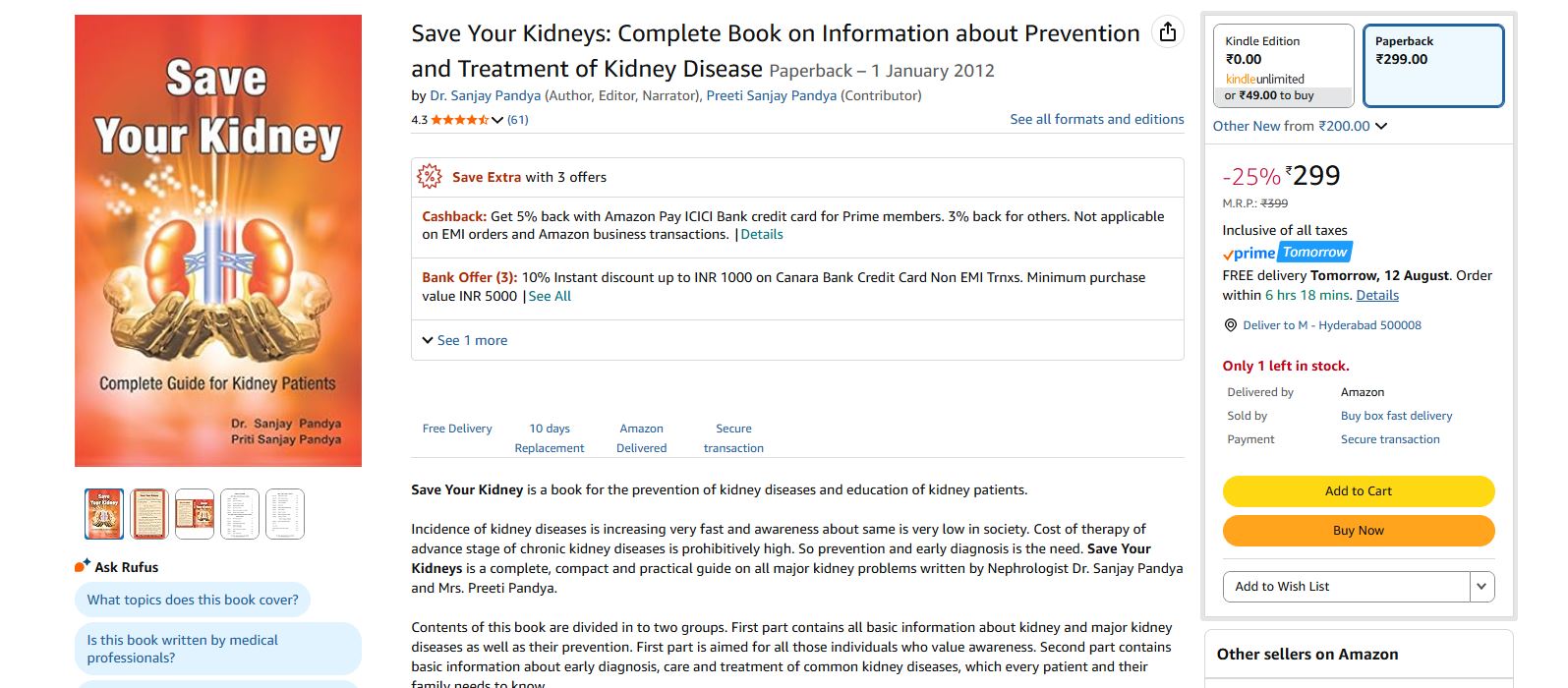Doctors warn that rising creatinine levels in people with diabetes may indicate declining kidney function. Long-term diabetes can affect not just the kidneys, but also the heart, nerves, and even dental health. When blood sugar levels fluctuate, creatinine buildup in the body can increase. In such cases, following a strict dietary regimen becomes essential.
Let’s explore what kind of diet can help manage creatinine levels effectively.
Diet Tips to Control Creatinine Levels
- Control Blood Sugar First: Keeping your blood sugar in check is crucial for managing creatinine.
- Limit Protein Intake: A low-protein diet is recommended, but care must be taken to preserve muscle mass.
- Watch Your Weight: Excess body fat or obesity can contribute to elevated creatinine levels, so maintaining a healthy weight is important.
- Prefer Plant-Based Foods: Include more pulses, soy, milk, and curd. These offer protein and support overall health.
- For Non-Vegetarians: Opt for lean meats like fish and chicken, and limit to two eggs per day (preferably cooked with minimal oil).
- Protein Limit: Do not exceed 90–100 grams of protein per day.
- Recheck Creatinine Levels: After following these dietary guidelines for two months, get your creatinine levels tested again.
Lifestyle & Nutritional Advice
- If You Have Diabetes and High Blood Pressure: Practice meditation, yoga, and regular exercise to keep both under control.
- Mineral-Rich Foods: Include foods high in potassium and magnesium.
- Hydration & Salt Intake: Drink adequate water and reduce salt consumption to support kidney health.
- Personalized Nutrition: Since dietary needs vary based on height, weight, and body composition, it’s best to consult a qualified nutritionist.
Follow the IndiaWorld.in channel on WhatsApp:https://whatsapp.com/channel/0029Vb3l9160AgWKgQeRCy0a
Save Your Kidneys: Complete Book on Information about Prevention and Treatment of Kidney Disease by Dr. Sanjay Pandya
: Click here to purchase

Young forever : you can purchase book with this Link : CLICK HERE TO PURCHASE

Based on the uploaded article about high creatinine levels, here’s a structured JSON-LD schema for both FAQPage and General FAQs that people are likely to ask:
✅ JSON-LD Schema: FAQPage
{
"@context": "https://schema.org",
"@type": "FAQPage",
"mainEntity": [
{
"@type": "Question",
"name": "What does high creatinine mean?",
"acceptedAnswer": {
"@type": "Answer",
"text": "High creatinine levels indicate reduced kidney function or other factors like dehydration, high-protein diet, intense exercise, or certain medications."
}
},
{
"@type": "Question",
"name": "What causes high creatinine levels?",
"acceptedAnswer": {
"@type": "Answer",
"text": "Common causes include kidney disease, dehydration, high muscle mass, creatine supplements, intense exercise, and pregnancy complications."
}
},
{
"@type": "Question",
"name": "Can creatinine levels return to normal?",
"acceptedAnswer": {
"@type": "Answer",
"text": "Yes, if the elevation is due to temporary factors like dehydration or diet. Chronic causes require medical treatment and lifestyle changes."
}
},
{
"@type": "Question",
"name": "What are the symptoms of high creatinine?",
"acceptedAnswer": {
"@type": "Answer",
"text": "Symptoms may include fatigue, swelling, shortness of breath, and changes in urination. Some cases may be asymptomatic initially."
}
},
{
"@type": "Question",
"name": "How is high creatinine treated?",
"acceptedAnswer": {
"@type": "Answer",
"text": "Treatment depends on the cause. It may involve hydration, dietary changes, medication adjustments, or dialysis in severe cases."
}
},
{
"@type": "Question",
"name": "Is creatinine level of 1.7 dangerous?",
"acceptedAnswer": {
"@type": "Answer",
"text": "A creatinine level of 1.7 mg/dL may suggest impaired kidney function and should be evaluated by a healthcare provider."
}
},
{
"@type": "Question",
"name": "When should I see a doctor for high creatinine?",
"acceptedAnswer": {
"@type": "Answer",
"text": "If you experience symptoms or have a creatinine level above the normal range, consult a doctor for further testing and diagnosis."
}
}
]
}
📋 General FAQs (Non-schema format)
- Can dehydration cause high creatinine?
Yes, dehydration can temporarily raise creatinine levels due to reduced kidney filtration. - Does a high-protein diet affect creatinine?
Yes, excessive protein intake or creatine supplements can elevate creatinine levels. - Is high creatinine always a sign of kidney disease?
Not always. It can result from temporary factors, but persistent elevation may indicate kidney issues. - What is the normal range for serum creatinine?
Typically 60–110 µmol/L (0.7–1.2 mg/dL), but it varies by age, sex, and muscle mass. - Can exercise raise creatinine levels?
Yes, intense physical activity can temporarily increase creatinine due to muscle breakdown. - What tests are done for kidney function?
eGFR, creatinine clearance, urine albumin, and blood urea nitrogen (BUN) tests are commonly used.








